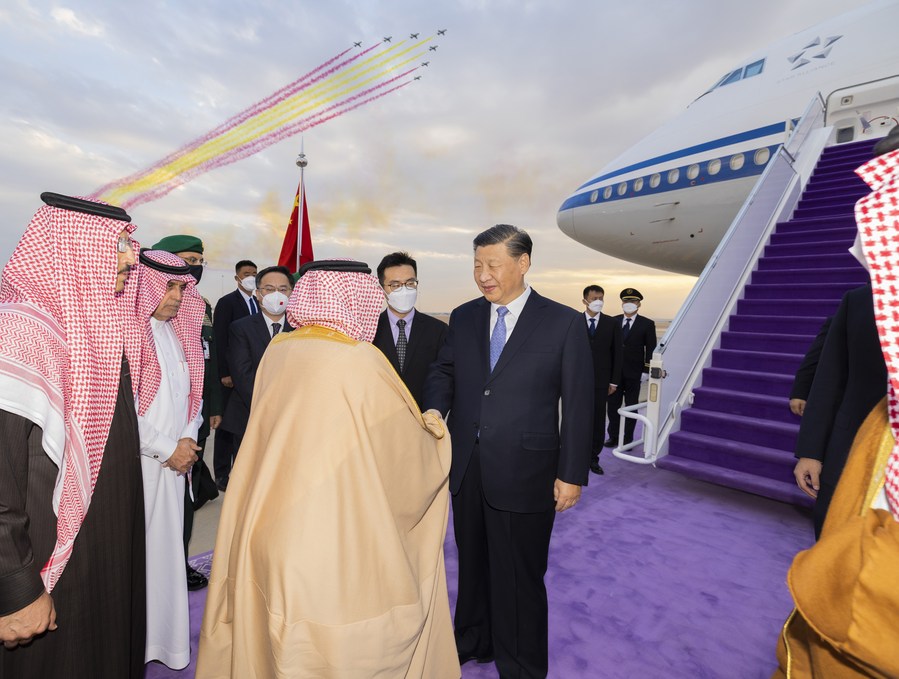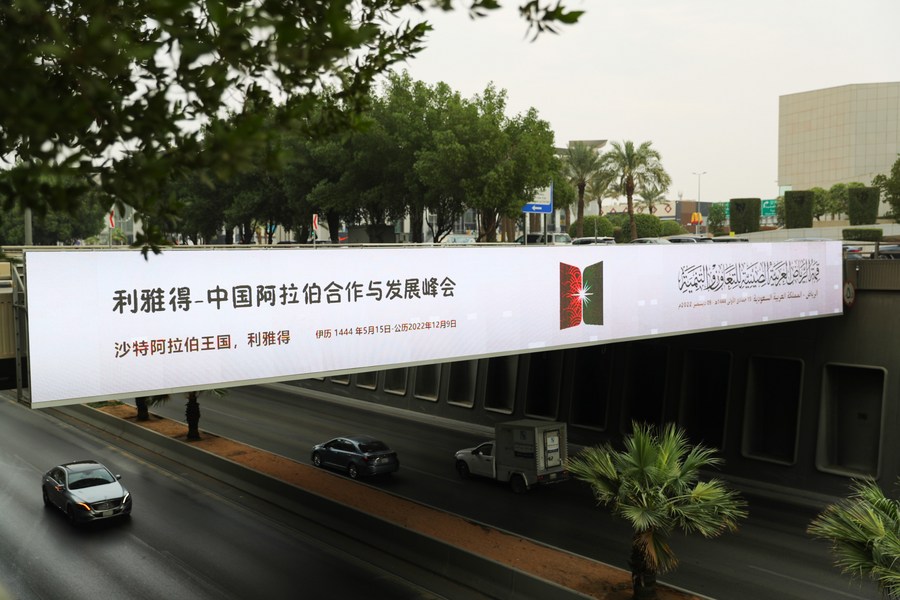Xinhua Commentary: Why Belt and Road cooperation matters to stronger China-Arab partnership

Chinese President Xi Jinping is warmly greeted upon his arrival by Governor of Riyadh Province Prince Faisal bin Bandar Al Saud, Foreign Minister Prince Faisal bin Farhan Al Saud, Minister Yasir Al-Rumayyan who works on China affairs and other key members of the royal family and senior officials of the government at the King Khalid International Airport in Riyadh, Saudi Arabia, Dec. 7, 2022.(Xinhua/Huang Jingwen)
In a world filled with uncertainties, the two sides need to carry forward the Silk Road Spirit, and forge ahead hand in hand to scale new heights in their cooperation. That will not only benefit both sides but also the world at large.
BEIJING, Dec. 8 (Xinhua) -- Though geographically far apart, China and the Arab world have been bound by a long history of friendly exchanges along the ancient Silk Road, making them natural partners for the Belt and Road cooperation.
Now, as the two sides are set to pursue more productive common development and march towards a brighter shared future, the Belt and Road Initiative can play a much bigger role.
Chinese President Xi Jinping has landed in the Saudi capital of Riyadh on Wednesday for the first China-Arab States Summit and the China-Gulf Cooperation Council (GCC) summit. He will also pay a state visit to Saudi Arabia.
These are landmark events in China-Arab relations. It is a clear demonstration of the firm faith and strong will shared by the two sides to elevate their strategic partnership, advance mutually beneficial cooperation, and work together to address global challenges and maintain world peace and stability in such turbulent times.
It is believed that the high-level exchanges will help China and the Arab world carry forward their traditional friendship, establish stronger consensus and further stimulate their Belt and Road cooperation, and thus lay a solid foundation for jointly building a China-Arab community with a shared future for the new era.
Friendly interactions between the two sides date back to ancient times. Since the People's Republic of China was founded over 70 years ago, the two sides have been treating each other with respect, learning from each other and carrying out win-win cooperation with remarkable results.

This photo shows a screen display about the China-Arab States Summit on a street in Riyadh, Saudi Arabia, Dec. 7, 2022. The first China-Arab States Summit and the China-Gulf Cooperation Council summit will be held in Riyadh. (Xinhua/Sui Xiankai)
Since Xi highlighted the Belt and Road cooperation at the sixth ministerial conference of the China-Arab States Cooperation Forum in 2014, the two sides, following the Silk Road Spirit of peace and cooperation, openness and inclusiveness, mutual learning and shared benefits, have stepped up efforts to unleash cooperation potential and nurture new growth drivers to common development.
So far, China has signed documents on the Belt and Road cooperation with 20 Arab states as well as the Arab League. And their joint projects, from the Central Business District in Egypt's new administrative capital to the 800-megawatt Al Kharsaah photovoltaic power station in Qatar, have improved the well-being of around 2 billion people and fostered development in the region.
The China-Arab cooperation continued to thrive despite the disruptive COVID-19 pandemic. In 2021, China remained the largest trading partner of Arab countries, with two-way trade growing by 37 percent year-on-year to around 330 billion U.S. dollars, and the two-way direct investment stock reached 27 billion dollars, 2.6 times greater than that in 2011.
In recent years, China's booming Belt and Road cooperation with the Arab world has also gained new dimensions, like health. To contain the COVID-19 outbreak, the two sides have lent a helping hand to each other and conducted cooperation in such areas as pandemic control, information sharing and vaccine research and distribution.
As the world is grappling with a range of unprecedented challenges, such as the persistent pandemic, a sharper-than-expected global economic slowdown and the global energy and food crises, China and the Arab world, with growing influence on the global stage, are expected to give full play to their respective advantages and play a bigger role in international affairs.
For the shared benefits of both sides as well as the world at large, it is important for China and Arab countries to join efforts to stabilize industrial chains, safeguard global energy security, tackle a series of pressing issues including poverty, terrorism and climate change, and preserve world stability.
A good friend and partner of the Arab world, China will, as always, uphold justice on regional hotspot issues and strengthen coordination and cooperation with Arab states to jointly promote peaceful and political solutions to those issues.
Beijing also looks forward to expanding Belt and Road cooperation with Arab countries in such fields as agriculture, infrastructure, investment and financing and high-tech industries, and facilitating people-to-people and cultural exchanges to bring the two civilizations closer.
Around 2,000 years ago, the ancestors of the two sides began to trade through the ancient Silk Road and forged a time-tested friendship that remains vibrant today.
In a world filled with uncertainties, the two sides need to carry forward the Silk Road Spirit, and forge ahead hand in hand to scale new heights in their cooperation. That will not only benefit both sides but also the world at large.


